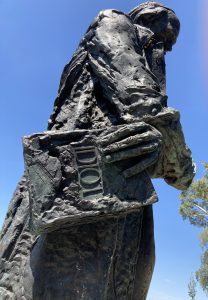 It’s Dostoevsky time again. Given what has happened in the world since Dostoevsky’s 200th birthday (November 11, 2021), it has been nearly impossible for me to focus in on this footsteps pilgrimage. How can I just keep hopping merrily from one effete place to the next, jotting down petty little notes about distant, dead writers, when their country is brutalizing its neighbor, indiscriminately murdering its weakest individuals (yes, children, mothers, including pregnant ones, the aged and sick) along with their homes, in plain sight? The evil of the invasion has paralyzed me, making the COVID pandemic, in retrospect, feel like a fun adventure. And some people are actually blaming Dostoevsky.
It’s Dostoevsky time again. Given what has happened in the world since Dostoevsky’s 200th birthday (November 11, 2021), it has been nearly impossible for me to focus in on this footsteps pilgrimage. How can I just keep hopping merrily from one effete place to the next, jotting down petty little notes about distant, dead writers, when their country is brutalizing its neighbor, indiscriminately murdering its weakest individuals (yes, children, mothers, including pregnant ones, the aged and sick) along with their homes, in plain sight? The evil of the invasion has paralyzed me, making the COVID pandemic, in retrospect, feel like a fun adventure. And some people are actually blaming Dostoevsky.
What is to be done? What is to be thought? What is to be said?
My journey through Russian literature began during the Cold War. In the 1970s, my fellow students would embark on study abroad in the USSR with the energy, openness and optimism of twenty-year-olds, and after a brief dip into the repellent realities of Soviet life would return eager to join the CIA and battle against the evil empire on behalf of free expression, free enterprise, and freedom of thought. I remember the darkness and fear of my first few trips (1976, 1982). There was no color–everything was black or gray, with occasional flashes of garish, bloody red. There were shortages (дефицит) and lines (очереди) everywhere. Officially, there was one way to think, and it always started out with, “As Lenin said….”. You could starve. People were crude, sad, and angry. Things broke.
Was I being followed? Was my room bugged? Was I happy to leave? YES, YES. YES. So why did I keep going back? It was the literature, and the writers and the readers with whom I have been in conversation about it ever since then, that roped me in. Against a regime dominated by venality, corruption, hostility, brutality, and lies, against a primitive, mendacious language of officialdom and greed, each generation of writers spoke, and speaks, their truth–a truth that plunges below the ugliness of the surface into the places in our spirit and mind that are real and human, the place where our fragile conscience nestles. Their truth-telling brings real danger–the more powerful and compelling the words, the more likely the writer will be taken out and shot, or imprisoned, or deprived of a livelihood. And still they speak–with extraordinary courage and eloquence that we readers feel in every word.
So I kept on reading, and my reading shaped my life. When to everyone’s surprise the USSR collapsed at the end of the 1980s, suddenly there was a demand for people who could teach the language to throngs of new undergraduates who felt that they could make millions of dollars by doing business with Russians. To be completely honest, without those econ students, I would never have gotten a job doing what I do now, or in fact kept it. I’m pleased to say, many of them got infected with the “big questions” bug along with me. In short, I had the great good fortune of getting to spend my life having my mind blown by Russian writers, and serving as a conduit for that mind-blowing to others. Despite the realities of biology, physics, and the earth’s orbit, these writers, along with their descendants, are very much still alive.
The 40 years of my own trivial adventure in Russian literature has unfolded during an unexpected interval in the long violent history of Russia, an impossibly brief few decades in which creative, thinking people had the opportunity to write openly, to explore their country’s suppressed, gruesome history, to access the full range of literature and news–their own as well as from around the world, and to participate in a free conversation about things that matter. Now many of these people are being persecuted in their country, or have had to flee. And I’m back where I started, seeking some kind of hope, conscience, and perspective. Where else to find it, but in literature, again?
Along the way, let this little tirade speak out loudly against Russia’s brutal invasion of Ukraine.
Well, I can’t go back to Siberia now, can I? And my planned Chekhov itinerary for the summer–Taganrog, Sumy, Yalta–lies crumpled in the trash. So…
Florence? Uh-oh. Give me a couple of days.

Leave a Reply